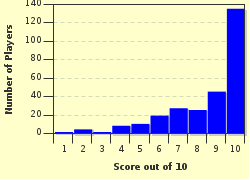Quiz Answer Key and Fun Facts
1. "And all the days of ______ were three hundred sixty and five years. And _____ walked with God: and he was not; for God took him." The scripture tells us that, like a few select other men of the Bible, this man did not see a mortal death. Who was he?
2. The book of Kings chronicles the lives of many mighty men of Israel, and this king spent the last of his days trying to keep warm. "Now king _____ was old and stricken in years; and they covered him with clothes, but he gat no heat. Wherefore his servants said unto him, Let there be sought for my lord the king a young virgin: and let her stand before the king, and let her cherish him, and let her lie in thy bosom, that my lord the king may get heat." Shortly thereafter, this king named his heir to the throne and "slept with his fathers," having reigned over Israel for forty years. Which king of Israel was it?
3. Genesis 25 gives us another death: "And these are the days of the years of _________ life which he lived, an hundred threescore and fifteen years. Then _________ gave up the ghost, and died in a good old age, an old man, and full of years; and was gathered to his people. And his sons ... buried him in the cave of Machpelah, in the field of Ephron ... there was _______ buried, and ... his wife." This man had two sons, one with his beloved wife, the other with her handmaiden. Who was he?
4. The book of Deuteronomy chronicles the next notable death. This man saw a mortal death, but was buried by God. "So _____ the servant of the LORD died there in the land of Moab, according to the word of the LORD. And he buried him in a valley in the land of Moab, over against Bethpeor: but no man knoweth of his sepulchre unto this day. And _____ was an hundred and twenty years old when he died: his eye was not dim, nor his natural force abated." Who was he?
5. One of many great prophets of old whose story is in II Kings, this man also did not see a mortal death. "And it came to pass, as they still went on, and talked, that, behold, there appeared a chariot of fire, and horses of fire, and parted them both asunder; and ______ went up by a whirlwind into heaven." Which prophet ascended to heaven?
6. One of many sons of David, this man tried to claim the throne and revolt against his father. David's generals hunted him down and saw, "________ rode upon a mule, and the mule went under the thick boughs of a great oak, and his head caught hold of the oak," And then Joab, "took three darts in his hand, and thrust them through the heart of _______, while he was yet alive in the midst of the oak." After which, the rest of the soldiers finished him off. "And they took _______, and cast him into a great pit in the wood, and laid a very great heap of stones upon him." Which son of David was this?
7. In John 11, we have an account of the not quite dead yet: "Jesus said, Take ye away the stone... the sister of him that was dead, saith unto him, Lord, by this time he stinketh: for he hath been [dead] four days. Then they took away the stone where the dead was laid. And Jesus lifted up [his] eyes, and said, ...with a loud voice, _______, come forth. And he that was dead came forth, bound hand and foot with: and his face was bound about with a napkin." Who rejoined the land of the living?
8. In I Samuel 4, a Hebrew priest and judge met an unfortunate end. "Now ____ was ninety and eight years old; and his eyes were dim, that he could not see." And a messenger told him of a battle with the Philistines, "and thy two sons ... are dead, and the ark of God is taken. And it came to pass, when he made mention of the ark of God, that he fell from off the seat backward by the side of the gate, and his neck brake, and he died." Which judge of Israel was this?
9. One cannot study Biblical deaths without covering some of the early Christian martyrs. "But when Herod's birthday was kept, the daughter of Herodias danced before them, and pleased Herod. Whereupon he promised with an oath to give her whatsoever she would ask. And she, being before instructed of her mother, said, Give me here _____'s head in a charger. And the king was sorry: nevertheless ... he commanded [it] to be given [her]. And he sent, and beheaded _____ in the prison." Whose death is referenced here?
10. Here's another Christian martyr; Acts 7 details the last death of this quiz. "And the witnesses laid down their clothes at a young man's feet, whose name was Saul. And they stoned ____,... And he kneeled down, and cried with a loud voice, Lord, lay not this sin to their charge. And when he had said this, he fell asleep." Whose death is referenced here?
Source: Author
TemptressToo
This quiz was reviewed by FunTrivia editor
CellarDoor before going online.
Any errors found in FunTrivia content are routinely corrected through our feedback system.

